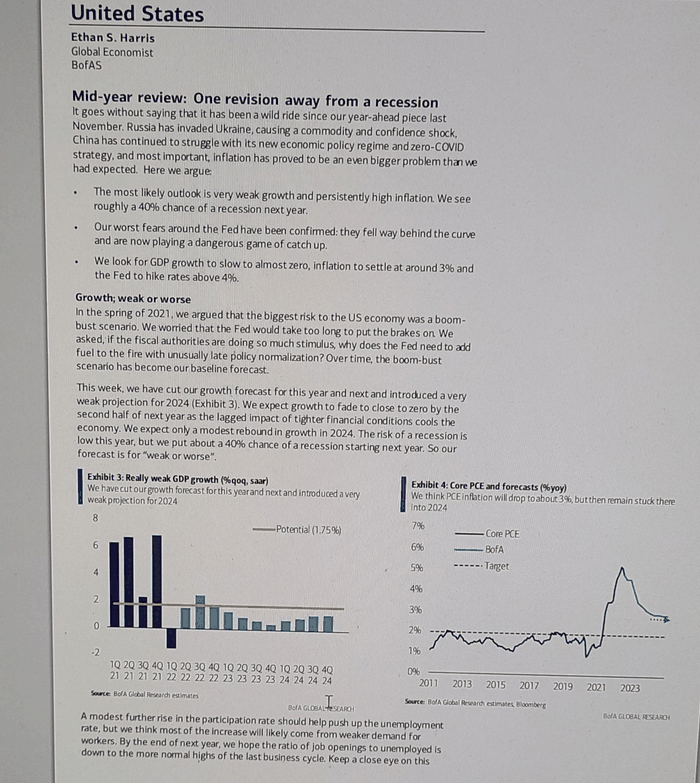The potential for a wage-price spiral is a real concern in the halls of managerial (as distinct from entrepreneurial) capital but the sentiment is usually not phrased in such a stupidly blatant fashion.
From The Intercept, July 29:
The financial behemoth privately fears that regular people have too much leverage.
A Bank of America executive stated that “we hope” working Americans will lose leverage in the labor market in a recent private memo obtained by The Intercept. Making predictions for clients about the U.S. economy over the next several years, the memo also noted that changes in the percentage of Americans seeking jobs “should help push up the unemployment rate.”
The memo, a “Mid-year review” from June 17, was written by Ethan Harris, the head of global economics research for the corporation’s investment banking arm, Bank of America Securities. Its specific aspiration: “By the end of next year, we hope the ratio of job openings to unemployed is down to the more normal highs of the last business cycle.”
The memo comes amid a push by the Federal Reserve to “cool down” the economy, informed by much of the same rationale — that high wages are driving inflation. This year, the Fed has increased interest rates for the first time since 2018. Historically, this has often caused recessions, and that is exactly what appears to be happening now: The Commerce Department reported Thursday that the gross domestic product has fallen for the second quarter in a row, indicating that a recession may have already begun.
Parts of the mid-year review, in particular its emphasis on a looming recession, received press coverage at the time of the memo’s release to clients. This is the first publication of the document in full.
What the memo calls “the ratio of job openings to unemployed” is generally calculated the other way around — i.e., the ratio of unemployed people to job openings. The more widely used ratio offers one measurement of the balance of power between workers and employers. The lower this number, the more options unemployed people have when searching for work and the greater opportunities employed people have to switch to jobs with better pay and conditions. According to the Bureau of Labor Statistics, this ratio stood at 0.5 as of May, meaning that there were then two job openings per unemployed person.
In 2009 — at the worst moments of the economic calamity that followed the collapse of the housing bubble during the end of the George W. Bush administration — the ratio climbed as high as 6.5, so there were more than six unemployed workers for each open job. It then slowly declined over the next decade, reaching 0.8 in February 2020 before Covid-19 lockdowns began.
This recent, unusual moment of worker leverage made Bank of America quite anxious. The memo expresses distress about “a record tight labor market,” stating that “wage pressures are … going to be hard to reverse. While there may have been some one-off increases in some pockets of the labor market, the upward pressure extends to virtually every industry, income and skill level.”
The memo recalls a previous Bank of America memo in 2021, which it says warned of “very strong momentum in the labor market, suggesting the economy would not just hit but blow through full employment. Fast forward to today, and these trends have been worse than expected.”
The memo is an uncanny demonstration that the economist Adam Smith was right when he described the politics of inflation in his famed 1776 work, “The Wealth of Nations.”....
....MUCH MORE
Related:
July 12
ICYMI: It Sure Looks Like A Wage/Price Spiral Has Begun
June 12
"Boris Johnson tells workers to accept pay cuts or UK faces 1970s–style ‘stagflation’"
That's a tough sell....
"By that measure there's plenty of room for the stock market to go even lower...."
The thing to know about inflation at this point is that it is becoming entrenched, that rather than going higher we should watch for it going wider. So while the folks who last year were scoffing that it's only lumber and it's only used cars will rejoice and trumpet the news from the rooftops when the headline number gets back below 8%, the Bank for International Settlements is warning about potential wage-price spirals.
Back to Mr. Elder.
He has seen just about everything the equity markets have to offer and is masterful at cutting through b.s. to get to what's what and who's who, and the introduction to this morning's Further Reading post does just that.
The fact that he's confirming my priors....
May 8BIS: "Are major advanced economies on the verge of a wage-price spiral?"
You don't want these people even raising this question. It's like hearing your surgeon say "whoops" just as you're going under: "Whaaa? zzzz"
